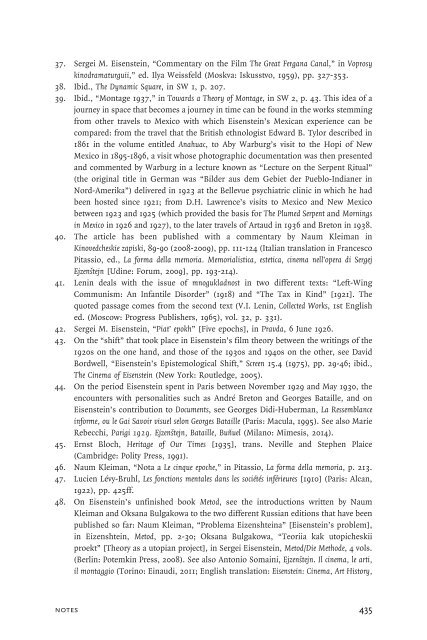- Page 1 and 2:
FILM THEORY IN MEDIA HISTORY SERGEI
- Page 3 and 4:
Film Theory in Media History explor
- Page 5 and 6:
This book is published in print and
- Page 7 and 8:
4. Act Now!, or For an Untimely Eis
- Page 9 and 10:
tors would like to warmly thank Jan
- Page 11 and 12:
not include here the diary entries
- Page 14 and 15:
Foreword Naum Kleiman In1997,onthee
- Page 16 and 17:
ideological “totalitarianism,”
- Page 18:
of writing the multivolume book on
- Page 21 and 22:
History of the USSR Academy of Scie
- Page 23 and 24:
Ill. 1 - A handwritten page from th
- Page 25 and 26:
Section 2 (Theory, History, Creatio
- Page 27 and 28:
dial perspective, as a medium remed
- Page 29 and 30:
only within the wider context of a
- Page 31 and 32:
three historicalperiods areintercut
- Page 33 and 34:
contained in Metod, the speech give
- Page 35 and 36:
One of the reasons why the Notes ca
- Page 37 and 38:
conception of the phases, while art
- Page 39 and 40:
presents it as one of the most impo
- Page 41 and 42:
ories continues to be present, and
- Page 43 and 44:
the past, the official aesthetic di
- Page 45 and 46:
In Montage, “synthesis” becomes
- Page 47 and 48:
ances of the idea of a total, synth
- Page 49 and 50:
“The Greeks, Diderot, Wagner, Scr
- Page 51 and 52:
sional films, as he writes in “Ab
- Page 53 and 54:
in literature in architecture etc.,
- Page 55 and 56:
up. The text “In Praise of the Ci
- Page 57 and 58:
nents. They both belong to “the h
- Page 59 and 60:
invented by Fox Talbot and the begi
- Page 61 and 62:
The only moment in which Eisenstein
- Page 63 and 64:
Khovanshchina, white as a tradition
- Page 65 and 66:
The myths and mysteries of Dionysus
- Page 67 and 68:
our perceptions work. This is not o
- Page 69 and 70:
is now what Eisenstein calls - with
- Page 71 and 72:
elements - a state that presumes th
- Page 73 and 74:
Such a dynamic generality of “the
- Page 75 and 76:
In writing poetry one is always aid
- Page 77 and 78:
His aspiration is toujours inassouv
- Page 79 and 80:
“primordial impulse” (ursprüng
- Page 81 and 82:
establishing the unmovable law of d
- Page 83 and 84:
time, the image of things is likewi
- Page 85 and 86:
possibilities, but rather thanks to
- Page 87 and 88:
[Riesenfilm] depicting the temporal
- Page 89 and 90:
panying “The Dramaturgy of Film F
- Page 91 and 92:
Both Eisenstein and Benjamin had fo
- Page 93 and 94:
In1932[sic]Ihadtriedtoorganizemythe
- Page 95 and 96:
Ill. 5 - A map drawn by Eisenstein
- Page 97 and 98:
Ill. 7 - Sergei M. Eisenstein, a dr
- Page 99 and 100:
The passage from the act of touchin
- Page 101 and 102:
total,environmentalworksofartcapabl
- Page 103 and 104:
montage, and later, audio-visual co
- Page 105 and 106:
same shift in awareness now as occu
- Page 108 and 109:
Part One Notes for a General Histor
- Page 110 and 111:
1 THE HEIR 1 Date: 22-26.X.1946 [RG
- Page 112 and 113:
The Phenomenon of Cinema (Historyof
- Page 114 and 115:
Throughallphenomenaofnature(biology
- Page 116 and 117:
CHRONICLE If we follow along the li
- Page 118 and 119:
Ill. 7 - Drawing showing an example
- Page 120 and 121:
2 DYNAMIC MUMMIFICATION NOTES FOR A
- Page 122 and 123:
Ill. 1 - A page from Eisenstein’s
- Page 124 and 125:
ence and the actors are one and the
- Page 126 and 127:
Date: Moscow, 10.VI.47 [RGALI1923-2
- Page 128 and 129:
Lostsecretsofpainterlyeffectsofearl
- Page 130 and 131:
image of an episode, the image of t
- Page 132 and 133:
Ill. 6 - Both Ill. 5 and 6 are take
- Page 134 and 135:
Ill. 9 - Another drawing containg a
- Page 136 and 137:
Ill. 11 - Hubert and Jan Van Eyck,
- Page 138 and 139:
Date: 24.XII.47 [Muzeikino40-1-12/1
- Page 140 and 141:
Ermolova 53 is“morerealistic”:t
- Page 142 and 143:
The pure reproduction of sound, as
- Page 144 and 145:
HISTORICAL EVALUATIONS Howtolookatd
- Page 146 and 147:
Multi-pointperspective.“TheLastSu
- Page 148 and 149:
#6. Color-stereo-television Briefsu
- Page 150 and 151:
The role of the development of the
- Page 152 and 153:
Date: 28.XII.47 One more device*: M
- Page 154 and 155:
Animat[ion] and the history of grap
- Page 156 and 157:
Ill. 28 - One of the most popular l
- Page 158 and 159:
Stained glass windows (999) 115 Asa
- Page 160 and 161:
C[amille]Silvy, 127 pupilofPaulDela
- Page 162 and 163:
1870 - America, the announcement of
- Page 164 and 165:
dynamic mumification 163
- Page 166 and 167:
Catalogue of the Nilsson Collection
- Page 168 and 169:
Photomontage Photomontage Composite
- Page 170 and 171:
Ill. 37 - Detail of Ill. 29 showing
- Page 172 and 173:
Callot Misèresdelaguerre Edgar Deg
- Page 174 and 175:
NB.Thetypicalpassionofprogressivefi
- Page 176 and 177:
3. Nickelodeon, Ventriloquy, Panopt
- Page 178 and 179:
American shots of strikes — 1902,
- Page 180 and 181:
Documentary claims TheMuséeGrévin
- Page 182 and 183:
TheSpanishandMoorishcottagesofHolly
- Page 184 and 185:
2) The neglecting of the organic me
- Page 186 and 187:
Ill. 45 and 46 - Edgar Dégas, Les
- Page 188 and 189:
Thehistoryoftheproblemoftime Thehis
- Page 190 and 191:
Le Ciel. Illusions, Visions LeCabar
- Page 192 and 193:
Moralité - it’s a “diary of ev
- Page 194 and 195:
cès ing ivit ne 107 en lede rre de
- Page 196 and 197:
NB. NB. In posters blaring titles a
- Page 198 and 199:
Here the authorship both of the tex
- Page 200 and 201:
Ill. 58 - El Greco, The Agony in th
- Page 202 and 203:
endings of the tactile nerves are f
- Page 204 and 205:
And the most curious thing is that
- Page 207 and 208:
Ill. G, H, and I - Photograms from
- Page 209 and 210:
A Peruvian vessel with the sound of
- Page 211 and 212:
The Uzbeks’ need for incessant ba
- Page 213 and 214:
2)Howtheinventor’sthoughtstumbles
- Page 215 and 216:
Ill. 2 - Drawing dated 7.VII.47 on
- Page 217 and 218:
One can read the principle of “sy
- Page 219 and 220:
Butthunderinconnectionwithabsolutel
- Page 221 and 222:
(theEnglishtermis“windinstruments
- Page 223:
(NB.BothhereandtherethereisaflightI
- Page 226 and 227:
4 IN PRAISE OF THE CINE-CHRONICLE 1
- Page 228 and 229:
Incidentally, the prototype for thi
- Page 230 and 231:
Recollections of this phase (of the
- Page 232 and 233:
Thesecondsex*is“drawnon” forirr
- Page 234 and 235:
Ill. 6 Butinany: Ill. 7 Also[the“
- Page 236 and 237:
The aestheticized game with levels
- Page 238 and 239:
7.XI.47 [RGALI1923-2-1031] ÜBERGAN
- Page 241 and 242:
Ill. M, N, and O - Photograms from
- Page 243 and 244:
And more complex: metaphorical stru
- Page 245 and 246:
The year 1050. Lenses in antiquity.
- Page 247 and 248:
Ill. P, Q, and R - Photograms from
- Page 249 and 250:
Old and New didn’t turn out to be
- Page 251 and 252:
Traceherethegeneralgenealogyofthepr
- Page 254:
Part Two Essays
- Page 257 and 258:
Various (in terms of time) phases o
- Page 259 and 260:
From Expressive Movement to “Cine
- Page 261 and 262:
Ill. 2 - Honoré Daumier, Robert Ma
- Page 263 and 264:
disjunction as producing a “motor
- Page 265 and 266:
For Eisenstein, Futurism is little
- Page 268 and 269:
2. “The Heritage We Renounce”:
- Page 270 and 271:
goal was to encourage research and
- Page 272 and 273:
elations of intersection, belonging
- Page 274 and 275:
The case of Terry Ramsaye’s A Mil
- Page 276 and 277:
Kurt-WilhelmMarek(whosignedhistexts
- Page 278 and 279:
painters to raise a monument to the
- Page 280 and 281:
The “Cradle” of Cinema Oneofthe
- Page 282 and 283:
whole series of films dealing with
- Page 284 and 285:
course oneconsidersthehypermemoryto
- Page 286 and 287:
of a socio-political type often dom
- Page 288 and 289:
From then on Eisenstein connects go
- Page 290 and 291:
3. The Notes for a General History
- Page 292 and 293:
Ill. 1 - The first drawing: the bar
- Page 294 and 295:
An image of a barricade appears in
- Page 296 and 297:
the essential interpretation of phe
- Page 298 and 299:
note that this opposition between t
- Page 300 and 301:
4. Act Now!, or For an Untimely Eis
- Page 302 and 303:
Hugo Munsterberg was pioneering in
- Page 304 and 305:
with a language of ideas/sensations
- Page 306 and 307:
authorship of the film as it made p
- Page 308:
career. In the 1920s, of course, th
- Page 311 and 312:
Ill. 1 - Alexander Rodchenko, poste
- Page 313 and 314:
given in the form of single frames
- Page 315 and 316:
which, according to him, gave the e
- Page 317 and 318:
moment” which requires emphasis.
- Page 319 and 320:
which is neither fixed nor obvious.
- Page 321 and 322:
they are paranoid and instrumentali
- Page 324 and 325:
6. Eisenstein’s Absolutely Wonder
- Page 326 and 327:
which point towardagenealogical mod
- Page 328 and 329:
such chronologies lending themselve
- Page 330 and 331:
“here today, gone tomorrow,” or
- Page 332 and 333:
preted as a “displacement” in w
- Page 334 and 335:
7. Dynamic Typicality Abe Geil Eise
- Page 336 and 337:
present a “defined character pass
- Page 338 and 339:
caste system gave each person a phy
- Page 340 and 341:
years leading up to the adoption of
- Page 342 and 343:
Galton staked the superiority of hi
- Page 344 and 345:
ens to reverse the direction of cau
- Page 346:
principle of typicality offers a wa
- Page 349 and 350:
e seenfrom hisveryearly writingsBaz
- Page 351 and 352:
origin and descent. Reflecting on f
- Page 353 and 354:
metaphors lifted from biology. “T
- Page 355 and 356:
sublation. In fact one can even arg
- Page 357 and 358:
of art and the “realistic tendenc
- Page 359 and 360:
of an event (Memling, Botticelli’
- Page 361 and 362:
ary concepts as point of convergenc
- Page 363 and 364:
nant sound (dominante) is the princ
- Page 365 and 366:
internal affect takes place. Eisens
- Page 367 and 368:
English under the title “A Dialec
- Page 369 and 370:
Moreover, it is precisely the heter
- Page 371 and 372:
diction penetrates into the affect
- Page 374 and 375:
10. Distant Echoes 1 Arun Khopkar
- Page 376 and 377:
children, the craven-hearted and pr
- Page 378 and 379:
Nonanthropocentric View of the Worl
- Page 380 and 381:
workman’s tools, etc. One of the
- Page 382 and 383:
Everyone had drunk far too much tha
- Page 384:
Whether it is a sexual ecstasy, an
- Page 387 and 388: mark next toit): “A friendly coop
- Page 389 and 390: than a static one (the organism as
- Page 391 and 392: It would be legitimate to recognize
- Page 394 and 395: 12. Eisenstein’s Mummy Complex: T
- Page 396 and 397: ernity. One of the pillars of this
- Page 398 and 399: tween them. The first category is d
- Page 400 and 401: A pivot point in this conception, t
- Page 402 and 403: “cine-chronicle” is thinking of
- Page 404 and 405: ality for humanity and its subjecti
- Page 406 and 407: 13. Sergei Eisenstein and the Sovie
- Page 408 and 409: was to focus on the Soviet cinema o
- Page 410 and 411: neers such as Eisenstein) shaped mu
- Page 412 and 413: the Venice Film Festival, sponsored
- Page 414 and 415: claim to the universality of aesthe
- Page 416 and 417: Bibliography Works by Eisenstein in
- Page 418 and 419: Mettre en scène. Translated by Jac
- Page 420 and 421: Ivanov, Viacheslav. “Estetika Eiz
- Page 422 and 423: Roshal’, Lev. Gore umu, ili Eizen
- Page 424 and 425: Iampolski,Mikhail.“TheoryasQuotat
- Page 426 and 427: Taylor, Richard, and Ian Christie,
- Page 428: Works on Eisenstein’s Drawings Ai
- Page 431 and 432: 6. Kinovedcheskie zapiski 36/37 (19
- Page 433 and 434: 5. In his essay published in this v
- Page 435: 28. The notion of “cultural serie
- Page 439 and 440: expressive movement of plants] […
- Page 441 and 442: 98. Montazh, p. 400. 99. Towards a
- Page 443 and 444: cinematic dispositif as an open, fl
- Page 445 and 446: indifferente (Venezia: Marsilio, 19
- Page 447 and 448: 244. Ibid., p. 12. 245. On the pres
- Page 449 and 450: 267. Jean Epstein, “L’Intellige
- Page 451 and 452: 315. Onthewayinwhichdifferentdefini
- Page 453 and 454: Spanish bandit El Maragato, in 1806
- Page 455 and 456: 2. Verweile doch, du bist so schön
- Page 457 and 458: once set off down such a promising
- Page 459 and 460: [“Dvizhenie tsveta”] for the un
- Page 461 and 462: “Pushkin and Gogol” (1946-48) h
- Page 463 and 464: piecesofmusicandcreatedabout300pain
- Page 465 and 466: along with a plan of the city. The
- Page 467 and 468: 1948) (cf. S.M. Eisenstein, Glass H
- Page 469 and 470: 108. Reference to one of the most p
- Page 471 and 472: 134. Eisenstein devoted several ent
- Page 473 and 474: 154. About this see Eisenstein’s
- Page 475 and 476: illustrations by Gustave Doré (183
- Page 477 and 478: Eisenstein of “thingism” [veshc
- Page 479 and 480: Fedotov (1815-1852), one of Eisenst
- Page 481 and 482: ofnatural phenomena andofthemytholo
- Page 483 and 484: to shoot double exposures for Bezhi
- Page 485 and 486: cinemawizardoftelevision,whowillbef
- Page 487 and 488:
4. Eisenstein writes about this in
- Page 489 and 490:
16. Unit 881, fund 1923, opus 2, Ru
- Page 491 and 492:
thousands of European and American
- Page 493 and 494:
“teleological” default for whic
- Page 495 and 496:
46. Georges Friedmann, “Sur une h
- Page 497 and 498:
EarlySovietCulture(DeKalb:NorthernI
- Page 499 and 500:
themselves” without the interfere
- Page 501 and 502:
sculptural group on the opera build
- Page 503 and 504:
characters’; in other words of an
- Page 505 and 506:
3. Lev Vygotsky, The Psychology of
- Page 507 and 508:
[New Brunswick: Rutgers University
- Page 509 and 510:
Turn-of-the-Century.” in Rethinki
- Page 511 and 512:
37. Galton, Inquiries into Human Fa
- Page 513 and 514:
26. Cf. my “A Cinema of Memory in
- Page 515 and 516:
31. “À partir de la félicité d
- Page 517 and 518:
7. Many of the traditional theatric
- Page 519 and 520:
deities, many of which are phenomen
- Page 521 and 522:
12. Philip Rosen, Eisenstein’s Mu
- Page 523 and 524:
17. Cristophe Dupin, “The Postwar
- Page 526 and 527:
Index of names NB The page numbers
- Page 528 and 529:
Brasillach, Robert 21, 272, 274, 32
- Page 530 and 531:
Didi-Huberman, Georges 7, 309-321,
- Page 532 and 533:
Grosz, George 57, 165, 335 Grusin,
- Page 534 and 535:
Lawrence, D.H. (David Herbert) 435
- Page 536 and 537:
Nil'sen, Vladimir 481 Nirnsee, Erns
- Page 538 and 539:
Salis, Rodolphe 274 Salome 69 Salt,
- Page 540 and 541:
Vatsyayan, Kapila 516 Veiller, Baya
- Page 542 and 543:
Contributors The Editors NaumKleima
- Page 544 and 545:
and Television, Comparative Critica
- Page 546:
uted seminal papers on film aesthet






